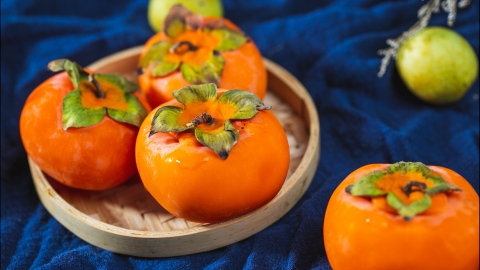What should not be eaten after consuming persimmons?
Generally, after eating persimmons, one should avoid consuming foods such as crabs, sweet potatoes, black dates, eggs, and spinach. Detailed explanations are as follows:

1. Crabs
Persimmons contain tannic acid, while crabs are rich in protein. When tannic acid combines with protein, it can form a hard-to-digest substance called tannic protein. Under the action of gastric acid, this substance may solidify into lumps, potentially causing gastrointestinal discomfort, pain, nausea, vomiting, and, in severe cases, digestive system diseases such as intestinal obstruction.
2. Sweet Potatoes
Sweet potatoes contain a large amount of starch, which can produce gastric acid after consumption. In the acidic environment of the stomach, the tannic acid in persimmons may react with components in sweet potatoes, potentially forming hard lumps that can disrupt gastrointestinal digestion. Additionally, both sweet potatoes and persimmons are relatively difficult to digest, and eating them together can increase the burden on the gastrointestinal tract, leading to symptoms such as abdominal distension, abdominal pain, belching, and acid reflux.
3. Black Dates
Black dates, like persimmons, contain large amounts of tannic acid. Consuming persimmons and black dates together may significantly increase tannic acid levels, increasing the risk of forming persimmon bezoars in the stomach. A high concentration of tannic acid in the stomach may hinder the digestion process, causing indigestion, nausea, and vomiting.
4. Eggs
Eggs are high in protein, and the tannic acid in persimmons can bind with the protein in eggs. This binding not only reduces the nutritional value of the protein but also makes it difficult for the protein to be digested and absorbed in the gastrointestinal tract. This may cause gastrointestinal discomfort, such as constipation or diarrhea, affecting normal digestive function.
5. Spinach
Spinach contains abundant oxalic acid, and persimmons contain tannic acid. When consumed together, oxalic acid and tannic acid may interact and form insoluble substances in the gastrointestinal tract, affecting digestion and nutrient absorption.
After eating persimmons, it is advisable to avoid consuming the above-mentioned foods simultaneously to reduce the risk of adverse reactions. If gastrointestinal discomfort or other symptoms occur, prompt medical attention should be sought.






